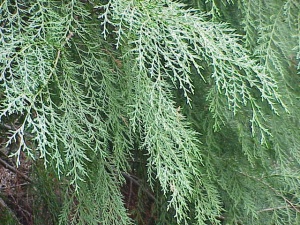Leylandii Wood
Leylandii wood is plentiful for some DIYers, and Leylandii are widely grown for construction timber in some countries. So it has some good properties and DIY uses.
Rot resistance
Leylandii wood is moderately durable, with better rot resistance than whitewood or redwood.
It has 2 strong biocidal chemicals, carvacrol and nootkatone. These are both fungicidal, giving it good rot resistance. These are found in the heartwood. Carvacrol is antiseptic & fungicidal.
Leylandii also has good termite resistance due to the carvacrol and nootkatone in the wood, though this is not an important issue in Britain.
Leylandii has mosquito repellant properties.
Resin
High resin content can make a mess on saw blades. Resin can be cleaned off with a solvent.
Resin also makes it not take paint well, as any resin seepage breaks up the paint surface.
If resin is ever wanted (eg for non-DIY uses) it can be harvested by a long low temp heating of the wood, eg in a relatively cool oven. The resin then comes to the surface and is scraped off. Avoid overheating the resin, 100C is too hot.
DIY Uses
Leylandii are good for general building work where high resin content is acceptable, such as framing, trusses, joists, etc.
Its also good for timber that will be oiled rather than painted, so can be used for cladding and other exterior uses if you're confident it won't be painted (now or in future).
Probably the ideal use then is where
- it will be used outdoors (rot resistance)
- it won't be painted
- it will be used in large section (resin on blades) (low cost)
Examples include:
The question of its use for chopping boards has also been raised, since Carvacrol is fungicidal and microbicidal. Carvacrol is the principle constituent of oil of origanum.
Its also sometimes used as firewood once dried out. It spits a lot, but provides plenty of heat, so is good in closed wood burners, but a total liability in open fires.
Availability
- Not found at many timber merchants
- Harvesting one's own
- Freecycle etc
References
- The sesquiterpenoid nootkatone and the absolute configuration of a dibromo derivative. Anne M. Sauer, Frank R. Fronczek, Betty C. R. Zhu, William E. Crowe, Gregg Henderson and Roger A. Laine.
